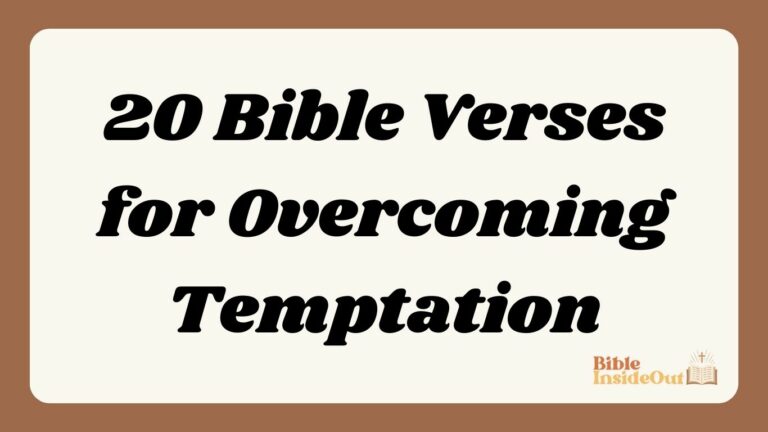25 Bible Verses About Virtues (With Commentary)
You might find it surprising that the concept of cardinal virtues, which predate Christianity, was seamlessly integrated into biblical teachings. As you reflect on your own life, consider how these virtues—prudence, justice, fortitude, and temperance—have been echoed throughout the ages in various scriptures, offering a timeless framework for moral conduct.
The Bible doesn’t just list these qualities; it weaves them into narratives and letters that resonate with the challenges you face today. Exploring these passages, you’ll uncover layers of wisdom that speak to the heart of human experience, guiding you towards a life of greater virtue.
Love and Compassion

As you examine the scriptural references, observe how they coalesce to form a robust theological framework for love and compassion.
Biblical texts such as 1 Corinthians 13:4-7 and 1 John 4:7 articulate the essential nature of love as a divine attribute and a moral imperative for believers.
These passages underscore the call to embody love and compassion as cardinal virtues, integral to Christian ethics and personal conduct.
1 Corinthians 13:4-7
"Love is patient, love is kind. It does not envy, it does not boast, it is not proud. It does not dishonor others, it is not self-seeking, it is not easily angered, it keeps no record of wrongs. Love does not delight in evil but rejoices with the truth. It always protects, always trusts, always hopes, always perseveres."
Corinthians 13:4-7 serves as a profound testament to the nature of love and compassion. It describes these virtues as patient, kind, and devoid of envy or boastfulness. It extols the virtues of patient endurance, sincere kindness, and steadfast love. This indicates that true affection is rooted in humble service and enduring hope. This scripture encapsulates the essence of intimacy through the lens of divine guidance.
Colossians 3:12
"Therefore, as God's chosen people, holy and dearly loved, clothe yourselves with compassion, kindness, humility, gentleness and patience."
In Colossians 3:12, believers are urged to clothe themselves with virtues such as compassion, kindness, humility, gentleness, and patience, epitomizing the behavioral standards expected within Christian love.
As the holy elect, dearly loved, you’re called to embody divine compassion.
Clothing metaphors illustrate an intimate transformation—adorn your character with these attributes as chosen people, weaving love into the fabric of your daily interactions.
1 Peter 4:8
"Above all, love each other deeply, because love covers over a multitude of sins."
Building upon the virtues outlined in Colossians, 1 Peter 4:8 emphasizes the paramount importance of love, asserting that it should prevail above all else, as it covers a multitude of sins with profound compassion.
Peter’s teaching promotes enduring love and fervent charity as heartfelt virtues. You’re called to exhibit sincere affection, a testament to the depth of your spiritual maturity and the authenticity of your commitment to others.
Ephesians 4:32
"Be kind and compassionate to one another, forgiving each other, just as in Christ God forgave you."
Ephesians 4:32 serves as a compelling directive, urging you to embody kindness and forgiveness, just as God in Christ forgave you, thus reflecting the profound virtues of love and compassion in your interactions.
Your forgiving nature catalyzes emotional healing, echoing divine kindness.
This scripture is pivotal in relationship mending, advocating for a heart softening that nurtures intimacy and genuine connection, fostering an environment where love can flourish unimpeded.
1 John 4:7
"Dear friends, let us love one another, for love comes from God. Everyone who loves has been born of God and knows God."
Reflecting on John 4:7, you’re invited to consider the profound implications of Jesus’ interactions, where He exemplifies love and compassion by engaging with a Samaritan woman at the well, challenging societal norms and embodying divine inclusivity.
This Samaritan encounter, piercing cultural barriers, becomes a divine appointment that addresses spiritual thirst.
Through water symbolism, Jesus transcends mere physical need, offering a living water that quenches the deeper longings of the soul.
Patience and Self-Control

As you examine the scriptural references to patience and self-control, you’ll find that these virtues are foundational to Christian ethics. Galatians 5:22-23 identifies them as fruit of the Spirit, revealing their divine approval and necessity in the believer’s life.
The wisdom literature, particularly Proverbs 25:28 and 15:18, juxtaposes the strength of a patient person with the vulnerability of one lacking self-restraint, thus offering a clear moral framework for behavior.
Galatians 5:22-23
"But the fruit of the Spirit is love, joy, peace, forbearance, kindness, goodness, faithfulness, gentleness and self-control. Against such things there is no law."
Galatians 5:22-23 highlights patience and self-control as integral components of the Fruit of the Spirit. These virtues are ones that you are called to cultivate as evidence of a life transformed by the Holy Spirit. Your commitment to fruitful living and spiritual growth is measured by these attributes. They are hallmarks of Christian character, reflecting divine nature and moral excellence. Furthermore, patience and self-control are essential for nurturing intimacy with God.
Proverbs 25:28
"Like a city whose walls are broken through is a person who lacks self-control."
Proverbs 25:28 serves as a poignant reminder that without patience and self-control, you’re as vulnerable as a city without walls, open to every kind of conflict and calamity.
To lead an unrestrained life is to forfeit emotional fortitude. Self-mastery, akin to city walls, provides a guarded spirit, shielding you from external chaos.
Cultivate these virtues; they’re the bedrock of a resilient, harmonious existence.
2 Peter 1:5-6
"For this very reason, make every effort to add to your faith goodness; and to goodness, knowledge; and to knowledge, self-control; and to self-control, perseverance; and to perseverance, godliness."
Building on the foundation of self-mastery discussed in Proverbs, 1 Peter 1:5-6 further emphasizes the necessity of fortifying one’s character with patience and self-control amidst life’s trials.
This passage elucidates the progression towards a divine nature, advocating for moral excellence built upon a faith foundation.
Here, precious promises underpin spiritual growth, underscoring that patience and self-control are integral to the intimate journey towards virtue.
James 1:19
"My dear brothers and sisters, take note of this: Everyone should be quick to listen, slow to speak and slow to become angry."
James 1:19 implores believers to listen swiftly, speak slowly, and maintain composure, thereby encapsulating the essence of patience and self-control in the life of a Christian.
The verse extols the virtues of active listening, measured speech, and thoughtful responses. Swift hearing combined with slow anger fosters a serene spirit, aligning with divine wisdom.
This approach is foundational to nurturing profound connections with others.
Proverbs 15:18
"A hot-tempered person stirs up conflict, but the one who is patient calms a quarrel."
Delving into the wisdom of scripture, one finds that Proverbs 15:18 highlights the profound impact that patience and self-control can have on diffusing conflict and fostering peace.
Anger management is critical; a hot-tempered individual stirs up strife.
In contrast, your calm approach invites peaceful resolution.
Wise handling of tense situations often leads to conflict de-escalation, circumventing the destructive consequences of unchecked rage.
Humility and Meekness

In examining biblical virtues, you’ll find that humility and meekness are consistently esteemed as qualities that believers should cultivate.
Scriptures such as Philippians 2:3-4 and Colossians 3:12 articulate the importance of valuing others above oneself and embracing gentleness.
Meekness, highlighted in Matthew 5:5, isn’t about weakness, but rather denotes strength under control, a concept further underscored by the teachings in James 4:6 and 1 Peter 5:5.
Philippians 2:3-4
"Do nothing out of selfish ambition or vain conceit. Rather, in humility value others above yourselves, not looking to your own interests but each of you to the interests of the others."
Philippians 2:3-4 challenges believers to embrace humility and meekness by valuing others above themselves and looking to the interests of others as a manifestation of Christ-like servitude. This Selflessness theme underscores Humble service and fosters a Unity focus within the faith community.
It’s a Consideration encouragement, urging you to prioritize Others’ interests, thereby cultivating a deeper, more intimate fellowship reflective of divine love and grace.
Matthew 5:5
"Blessed are the meek, for they will inherit the earth."
Turning to Matthew 5:5, we find a powerful beatitude that holds humility and meekness in high regard, as it promises the earth to those who embody these virtues.
This verse extols spiritual meekness, a gentle strength far removed from weakness. It assures an earth inheritance for those who practice quiet submission before God.
This blessed assurance underscores a profound truth: true power is found in humility.
Colossians 3:12
"Therefore, as God's chosen people, holy and dearly loved, clothe yourselves with compassion, kindness, humility, gentleness and patience."
Reflecting further on the theme of humility and meekness, Colossians 3:12 calls you to clothe yourself with these virtues as a chosen one of God, holy and dearly loved. Within the Colossian context, this instruction is pivotal for virtue cultivation. It emphasizes a holy wardrobe, beseeching chosen people to don heartfelt mercy.
This passage underscores the necessity of adopting a disposition marked by profound humility.
James 4:6
"But he gives us more grace. That is why Scripture says: 'God opposes the proud but shows favor to the humble.'"
Building upon the theme of humility and meekness, James 4:6 offers a compelling directive. It asserts that ‘God opposes the proud but shows favor to the humble.’ This verse admonishes you to eschew spiritual pride. Divine humility is where grace abounds. By opposing arrogance, you align with a tradition of humble service. This positions yourself to receive the fullness of God’s favor.
1 Peter 5:5
"In the same way, you who are younger, submit yourselves to your elders. All of you, clothe yourselves with humility toward one another, because, 'God opposes the proud but shows favor to the humble.'"
In the same vein as James 4:6, 1 Peter 5:5 reinforces the biblical imperative for humility, reminding believers that ‘God resists the proud, but gives grace to the humble.’
Peter’s humility underpins this verse, promoting leadership servanthood.
You’re called to exhibit clergy respect, generational modesty, and elders’ submission, embodying the virtue where power and status bow to the divine principle of meekness.
Honesty and Integrity

You’ll find that Scripture places a high premium on the principles of honesty and integrity. Verses such as Proverbs 12:22 and Ephesians 4:25 articulate a divine preference for truthfulness.
Additionally, texts like 2 Corinthians 8:21 underscore the importance of conducting oneself in a manner that’s honorable before both God and people.
Proverbs 12:22
"The Lord detests lying lips, but he delights in people who are trustworthy."
Reflecting on Proverbs 12:22, it’s evident that the ancient wisdom of this scripture places a high premium on the moral qualities of honesty and integrity, viewing them as vital to a righteous life.
Lying lips and deceptive speech are admonished, whereas a truthful testimony is extolled. Dishonesty is detested; it’s clear that integrity isn’t just recommended but upheld as a pillar of virtuous conduct.
Ephesians 4:25
"Therefore each of you must put off falsehood and speak truthfully to your neighbor, for we are all members of one body."
Building upon the theme of integrity found in Proverbs 12:22, Ephesians 4:25 reinforces this virtue by urging believers to discard falsehood and embrace truthful communication with one another.
This directive calls for truthful living, a commitment to relational honesty that eschews deceptive avoidance. Authentic communication fosters trust and unity, while constructive speaking builds up the community.
It’s a clear mandate: live and speak in truth.
Proverbs 11:3
"The integrity of the upright guides them, but the unfaithful are destroyed by their duplicity."
Proverbs 11:3 posits that the integrity of the upright guides them, while the crookedness of the treacherous destroys them, emphasizing the foundational role of honesty and integrity in sustaining moral character.
Integrity’s reward is a life steered by righteous guidance. Your moral compass, calibrated through truthful living, fortifies character strength, ensuring that you tread a path illuminated by the virtues of honesty and integrity.
2 Corinthians 8:21
"For we are taking pains to do what is right, not only in the eyes of the Lord but also in the eyes of man."
In Corinthians 8:21, we find a compelling directive: ‘For we’re taking pains to do what’s right, not only in the eyes of the Lord but also in the eyes of men,’ underscoring the dual importance of maintaining honesty and integrity before both divine and human witnesses.
This verse, steeped in the Corinthians context, exhorts biblical prudence and ethical foresight, advocating for moral planning aligned with scriptural intentions.
Leviticus 19:11
"Do not steal. Do not lie. Do not deceive one another."
You’ll find that Leviticus 19:11 serves as a foundational precept, emphatically instructing, ‘Do not steal. Don’t lie. Don’t deceive one another,’ thereby encapsulating the essence of honesty and integrity in biblical teachings.
Within the Leviticus context, these ancient laws codify moral imperatives, shaping societal norms and covenant obedience.
This verse crystallizes ethical conduct, pivotal for intimate relational dynamics and communal trust.
Kindness and Generosity

You’ll find that the scriptures place significant emphasis on the virtues of kindness and generosity.
Analyzing verses such as Ephesians 4:32 and Proverbs 11:25 reveals an intrinsic reward system for benevolent acts, underpinning these virtues as spiritual imperatives.
Moreover, texts like 2 Corinthians 9:6-7 and Luke 6:35 elucidate the principle of selfless giving as a reflection of divine grace.
Ephesians 4:32
"Be kind and compassionate to one another, forgiving each other, just as in Christ God forgave you."
Ephesians 4:32 serves as a compelling mandate, urging believers to embody kindness and generosity as tangible expressions of Christ-like character. It emphasizes a forgiving heart as essential for emotional healing and relationship mending.
This verse elucidates the transformative power of divine kindness, which fosters unity encouragement, underscoring the profound impact that compassionate behavior can have on both individual souls and the collective body of the faithful.
Proverbs 11:25
"A generous person will prosper; whoever refreshes others will be refreshed."
Building on the theme of compassionate conduct, Proverbs 11:25 reinforces the notion that kindness and generosity aren’t just moral duties but pathways to personal enrichment and community prosperity.
You embody the Cheerful giver, whose Generosity rewarded facilitates Spiritual prosperity.
Nourishing others seeds Abundant blessing in return, creating a reciprocal cycle of benevolence that transcends mere transactional interactions, fostering a deep, enduring societal fabric.
2 Corinthians 9:6-7
"Remember this: Whoever sows sparingly will also reap sparingly, and whoever sows generously will also reap generously. Each of you should give what you have decided in your heart to give, not reluctantly or under compulsion, for God loves a cheerful giver."
Drawing upon the agricultural metaphor, Corinthians 9:6-7 illuminates the principle that sowing sparingly yields scant returns, while lavish sowing begets bountiful harvests, underscoring the profound impact of generosity on both giver and receiver.
Embracing the generosity principle, you become a cheerful giver, ensuring reaping bountifully.
This passage invites intimate reflection on financial stewardship, encouraging you to sow abundantly in kindness, reaping the rewards of generosity.
Luke 6:35
"But love your enemies, do good to them, and lend to them without expecting to get anything back. Then your reward will be great, and you will be children of the Most High, because he is kind to the ungrateful and wicked."
Continuing the exploration of generosity, Luke 6:35 extends the concept by advocating for kindness without expectation of return, highlighting the virtue of unconditional love in giving.
Luke’s teachings here evoke divine mercy, urging you to embody creditor’s grace.
This passage demands a radical enemy love, challenging you to practice unconditional giving, a testament to the profound depth of generosity expected from followers of Christ.
Hebrews 13:16
"And do not forget to do good and to share with others, for with such sacrifices God is pleased."
Hebrews 13:16 emphasizes the importance of sharing goods and doing good works as central acts of worship, reflecting a clear biblical mandate for kindness and generosity.
It calls for Community Support through Generous Giving and the pooling of Shared Resources.
This scripture teaches you to embody compassion by Remembering Others in need and encourages the making of Sacrificial Offerings, underscoring selflessness as a divine principle.
Conclusion
Embrace love, as it binds all virtues in perfect harmony; practice patience, for it forges strength in adversity.
Cultivate humility, the quiet soil from which greatness blooms; adhere to honesty, the unshakeable pillar of trust.
Extend kindness, a currency of the compassionate heart; and exercise generosity, the hand that uplifts souls.
In living these scriptural truths, you not merely walk in virtue’s path but also inspire its flourishing in the tapestry of humanity.







